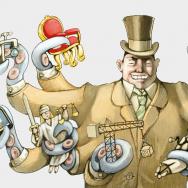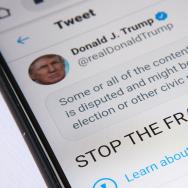Tech giants like Twitter and Facebook banned Donald Trump from their platforms after the violence at the U.S. Capitol on Jan. 6. Their removal of a sitting president’s account raised questions about free speech and responsible social media moderation—but it also demonstrated the political power of Big Tech to control the flow of information and advertising.
Nobel Prize-winning economist Paul Romer, a University of Chicago alum, recently offered some insights into the problem of corporate power concentration—and the challenges that it poses for democracy. A professor at New York University, Romer discussed these topics in a virtual event with Prof. Luigi Zingales of the Booth School of Business.
The Jan. 14 conversation was a part of the Stigler Center’s series of antitrust conferences, which bring together economists, legal scholars, historians and political scientists to explore the interconnections between market power and political power.
The event focused on a central question: Do we need to modify antitrust policy? And if yes, how? Romer mentioned that he had recently conducted an informal poll, asking survey respondents whether Facebook CEO Mark Zuckerberg could influence a close political election.
“What was striking was that the more people knew about the details of political advertising on Facebook and things like its news feed, the stronger was their assertion that yes, indeed, if he chose to, Zuckerberg could influence a close election and do so without violating any law,” said Romer, SB’77, PhD’83, a former UChicago faculty member.
Market concentration, he added, is “the fundamental problem that we have to grapple with—one that is more important and more fundamental than this issue about whether or not moderation is censorship,” he added. “If you think that moderation [within a firm] is censorship … you’ve got a competition problem.”
But how do we fix the tech market concentration problem in the U.S.? Romer’s preferred method is to impose a Pigouvian tax—that is, a tax that increases with the size of the company upon which it’s being levied.
“Suppose that we wanted to make sure that there were several different manufacturers of aircraft worldwide, and that was in the interests of the U.S. and U.S. consumers. We could put a tax on the sale of aircraft. We could put a tax on tickets. It doesn’t matter where you levy it, but the nature of that tax is that it should be progressive. The marginal tax rate should increase with the scale of the firm that made the airplane that the flight is using,” Romer explained.
Such a tax would be an effective tool to keep firms from getting too big, as it would give some advantage to smaller firms, make it less attractive for firms to go out and buy more firms and even make it more attractive for them to spin-off certain parts of their business, according to Romer.
Romer argued that the implementation of such a tax would not just address the size of these tech firms but also their business model, which is based on advertising and is the reason why the firms try to maximize engagement.
“Small countries in the world would be wise to take very seriously the possibility of putting a tax on all digital advertising revenues that are collected by these firms that are mostly outside their borders and are undermining the functioning of markets,” said Romer.
In addition to a Pigouvian tax, Romer mentioned other potential solutions to the problem of Big Tech concentration during his talk. These include a public record of all advertisements, along with information about how many and what types of people they were shown to, a public option for online search that businesses could sign up for and a more flexible merger-review process.
—Adapted from a story written by Jana Kasperkevic and published by ProMarket from the Stigler Center.

